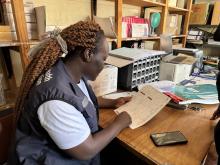WHO conducts technical mission to strengthen schistosomiasis medicine management in Zimbabwe
Harare—World Health Organization (WHO)'s Regional Office for Africa (AFRO), through the Expanded Special Project for the Elimination of Neglected Tropical Diseases (ESPEN), conducted a joint technical mission to Zimbabwe from 7-11 July 2025. The mission, conducted in collaboration with the pharmaceutical donor Merck and the WHO Country Office in Zimbabwe, aimed to strengthen national supply chain systems related to the management of donated Praziquantel (PZQ), a critical medicine used in the treatment and elimination of schistosomiasis commonly known as bilharzia.
Neglected Tropical Diseases (NTDs) continue to affect over a billion people across 149 tropical and subtropical countries. In the WHO African Region alone, 45 of the 47 countries require preventive chemotherapy to manage and eliminate these diseases. Among them, schistosomiasis remains a major public health concern, particularly in sub-Saharan Africa, including Zimbabwe.
In support of endemic countries, ESPEN and its partners, including Merck, work to ensure the timely donation, management, and delivery of medicines such as Praziquantel. However, recent challenges such as unaccounted stock, expiry risks, and delayed treatment reporting have negatively impacted the effective use of these medicines, posing risks to both the elimination efforts and the sustainability of the WHO drug donation programme.
Using interviews, field visits and document reviews, the mission examined how the medicine is managed across different levels of the supply chain, from central warehouses to rural health facilities. One of the key findings was a lack of uniformity in data management. While central systems have been automated for better tracking and reporting, some rural facilities continue to rely on manual data entry, using handwritten records. This gap has contributed to reporting delays and reduced visibility on medicine stock levels.
Despite these challenges, the mission also highlighted notable strengths in Zimbabwe’s approach to NTD medicine management. There is strong coordination between the Ministry of Health and Child Care and the National Pharmaceutical Company of Zimbabwe (NATPHARM), which has ensured clear procedures are in place, particularly for the management of expired medicines.
Officials involved in the visit emphasized the importance of accurate, timely data and robust accountability mechanisms to improve stock visibility and guide future drug donations. With Praziquantel’s relatively short shelf life, inefficiencies in stock handling can result in significant wastage and missed opportunities for treatment in affected communities.
The findings from the Zimbabwe mission will be used to develop a set of tailored recommendations to improve medicine supply chain performance and reporting systems. These lessons are expected to contribute not only to Zimbabwe’s efforts but also inform regional strategies across countries facing similar challenges.






